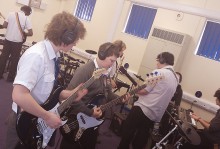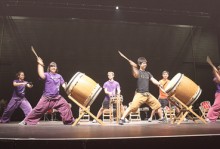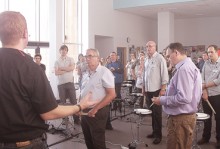Twenty years ago the greatest change in popular music making took place. A change so dramatic that many of us are still coming to terms with the shift in focus. Unbelievable as this may sound, it all stemmed from Chesney Hawkes and his hit single ‘The One & Only’ in the spring of 1991.
Chesney was a clever guy; he made sure his band were top musicians, all pupils of renowned educationalist Norton York. These boys could all really play, but none of them were able to obtain a qualification in the instrument they played.
Why you ask? Prior to 1991 it was impossible to take an examination in many of our most popular instruments. Drum kit, electric guitar, bass guitar, keyboards and popular voice were not recognised by the establishment. Norton and his friend Simon Pitt knew things had to change. Baby steps had begun to be taken by some, but things weren’t moving fast enough. So they drove forward with a whole new approach, rockschool was born. This truly was a seismic shift, finally you could walk into an exam with an electric bass and be assessed.
In their first year 75 popular musicians took the plunge. 20 years later exams are available in 30 countries, with thousands of students across the globe obtaining a qualification last year. All major exam boards have subsequently followed rockschools lead.
In many places, rockschool still finds itself on the fringes. Let’s see if we can demystify some of the myths and highlight the many pathways available.
So what do Rockschool offer?
- ‘Debut’ grades in Bass, Drums, Guitar & Piano – superb starting point to prepare your students for their first exam
- Grades 1-8 in Bass, Drums, Guitar, Piano & VocalsGrades 1-5 in band based keyboards – a syllabus that fits the guitar, bass and drum repertoire enabling bands to learn together Music Practitioner Levels 1-3 – a viable and arguably more current alternative to GCSE at Level 2 and College at Level 3
- These can be approached as you would normally expect with three pieces, technical exercises, sight reading or improvisation & interpretation (grades 1-5), quick study piece (grades 6-8), ear tests and general musicianship questions
- Or as a performance certificate from Debut grade – grade 8. Students select 5 pieces to perform with no supporting exercises or questions. From grade 1 onwards students are able to select two of their own choices of piece.
- Band exams are available for guitar, bass & drums at grades 3,5 and 8.
- DipRSL Teaching Diploma (Level 4) – Following a request by the Musicians Union, Rockschool created this qualification allowing students 18 or over with grade 8 in their instrument and some teaching experience a route to PGCE that recognizes the abilities and talent already evident in the candidate
Over the last 20 years rockschools palette of accredited qualifications has grown dramatically. To truly understand what it feels like to engage with the organisation, we need to get to the coal face. Let’s focus on their core business of graded examinations and visit someone with a unique perspective….
Ben Chadwick – Assistant Head of Service, Bolton Music Service
Ben is the rarest of breeds, a woodwind specialist for Bolton Music Service who also teaches small and large group percussion. A unique perspective on the rockschool approach….
As someone that regularly teaches both woodwind and percussion students, I’m familiar with the benefits and drawbacks of the syllabuses of several examination boards. I’m also all too familiar with the huge variance in theoretical knowledge that students can bring to their lessons as a result of following these syllabuses.
We’ve all come across them….those new students who claim to be good drummers, only to demonstrate that the only skills they have ever developed are the ability to play “beats”. Sight-reading, hand technique, musical notation reading and rhythmic understanding all seem to take a ‘back seat’. This is something I care passionately about. After all, I’m not just trying to enable my students to become good performers, but good musicians as well. I want them to enjoy instant musical experiences whilst backing this up with building a decent technique.
Rockschool manages to cover all relevant areas without being daunting or boring. The emphasis is on performing with good balance in this discipline. It is interesting that in an era where most of my students listen exclusively to rock music, “Trench town” is almost always selected by pupils, who are amazed at how different the style of drumming is in reggae. Drum ‘n Bass and Rockabilly pieces are also evident in the syllabus and this variety often contributes to an increase in practice. This is exactly what exam pieces should do, not just practical exercises but challenges that intrigue, inform and inspire.
To balance the three performance pieces, rockschool include a host of technical exercises. I greatly respect them for not following the trend of allowing students to opt out of rudiments (scales in the tuned world). It is good to see their rudiments are ‘pitched well’ in terms of difficulty and also spread around the kit. This makes it much easier for students to see their practical application and be able to use them in their own playing. Power and speed count for nothing without the control that these exercises teach, imagine asking Usain Bolt to run 100m in stiletto’s…
Ben demonstrates clearly the benefits of rockschool. Whilst spending a large proportion of his working week within his ‘specialism’ of woodwind, with a history steeped in Associated Board and Trinity Guildhall, he finds it straight forward to work with a different syllabus and approach as the core structure in essence remains the same.
But what are the issues with the syllabus? Some teachers express a concern in gaps in knowledge and the desire of students to play repertoire of their favourite bands. We travel to the home of John, Paul, George and Ringo to find out more….
Mat Lomas – Guitar Teacher, Liverpool Music Support Service
Mat teaches guitar to small and large groups across all key stages in schools throughout Liverpool
I first came across Rockschool as a 15 year old guitar student. More than 10 years later I am still using the syllabus regularly supplementing student’s goals and achievements. On the whole I am an advocator of the grade system, when used in conjunction with other resources it really works. I find rockshools layout simple and friendly which creates a fun learning environment. The emphasis is on playing with real musicians using supplied backing tracks. This helps ‘out’ the bedroom musician, who fears performing outside of their closed environment.
Advanced grades offer more creativity, improvisation or free choice sections of the music where the student decides on the beat, rhythm or chord voicing etc. A real positive from the grade books is the sense of achievement when a student can play along in time, note for note with a song, demonstrating an understanding of musical performance.
There are drawbacks with the syllabus for students who want to play songs by artists they aspire to be. Historically there has been a heavy emphasis on instrumental music. The inclusion of a couple of popular songs in each book would really help.
I use rockschool in conjunction with other resources. The syllabus teaches in a concise, engaging and informative way, but it also leave gaps. I believe it works best when delivered by a teacher, not as a self-tutorial.
Whilst Mat uses Rockschool, he feels the need to supplement their syllabus to enable his students to explore the music that inspires them. Many across the world felt the same way. Rockschool listened and reacted, launching their Hot Rocks series in 2008. Damian Pugh tells us more….
Damian Pugh – Senior Percussion Teacher, Gwent Music Support Service
Gwent Music Support Service has built a reputation of producing high quality percussionists. They are regulars at the National Festival of Music for Youth and have recently been proposed as possibly the best Music Service in the Uk by Eric Tebbutt
I’ve used rockschool since 2001, entering pupils at every grade level, including myself! Since 2008 I have seen huge benefit in the Hot Rock series. Hot Rock are a great resource with a mixture of classic and contemporary tracks. They also come with a graded and original version. Many of my students have chosen to perform a track they know and associate with in their exam. Out of the 3 pieces you need to play you can replace one with a Hot Rock. The original transcriptions are uncensored so they range in difficulty; many are great for GCSE and A level performance exams.
For me, rockschool offer a relevant, high quality resource. Their approach is student friendly but keeps the rigor I expect from a music examination whilst engaging many in their advertising and packaging approach.
But I find a lack of rudimentary elements I would expect to see in a modern syllabus. I find myself starting pupils with other boards up to Grade 2 then moving across to rockschool. This gives a sound rudimentary grounding moving onto the performance based focus with rockschool as they progress.
Damian succinctly highlights my own biggest historical draw back with rockschool. They are perceived as the soft option. Whilst challenging students superbly in their abilities to play, vital technical areas are being overlooked.
In an act typical of an organisation that prides itself in listening, CEO Simon Pitt flew in from Poznan in Poland, one of their newest exam centres, to meet me personally. He acknowledged customers had expressed short falls in the technical curriculum; these points have been dealt with and corrected for the new syllabus out next year.
I expressed a concern many had raised in the cost of publications. Other boards offer two grades per book, why doesn’t rockschool? Unlike many others, rockschool offer everything the student needs to pass their exam in one book, thus saving money. Rockschool also haven’t raised their book prices since 1998.
As we talked further, their success seemed to me to be their problem. They are now accepted as an organisation, but are compared with contemporaries who have been perfecting their craft since the late 1800’s. Not bad going for a company 20 years old. Simon admits they have made mistakes, but they have reacted to them, quickly.
I started this journey an unbeliever, 10 years teaching and I have never put a student in for a rockschool exam is testament to that! I have found an exam board who listen and react, offer relevant and engaging curriculum and continue to be market leaders and innovators in their field. I have found teachers across the country passionate about their craft who embrace the syllabus completely, but above all I have found students who previously struggled to engage with formal learning obtaining grades playing music they love. Whatever your internal prejudices may be and I had many, give rockschool a go. You’ll be missing out if you don’t. And to think this is all thanks to Chesney Hawkes….








